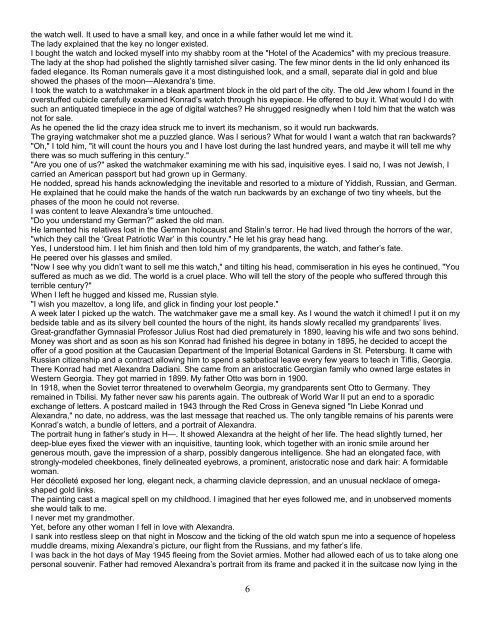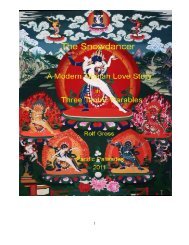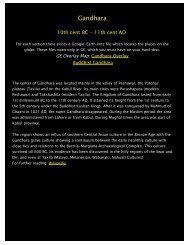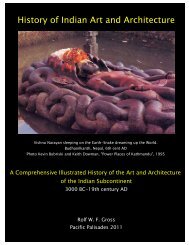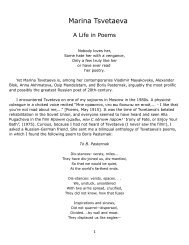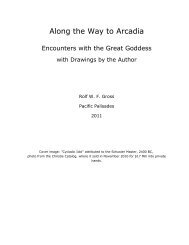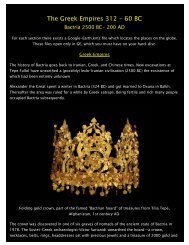the watch well. It used to have a small key, <strong>and</strong> once in a while father would let me wind it.The lady explained that the key no longer existed.I bought the watch <strong>and</strong> locked myself into my shabby room at the "Hotel of the Academics" with my precious treasure.The lady at the shop had polished the slightly tarnished silver casing. The few minor dents in the lid only enhanced itsfaded elegance. Its Roman numerals gave it a most distinguished look, <strong>and</strong> a small, separate dial in gold <strong>and</strong> blueshowed the phases of the moon—Alex<strong>and</strong>ra’s time.I took the watch to a watchmaker in a bleak apartment block in the old part of the city. The old Jew whom I found in theoverstuffed cubicle carefully examined <strong>Konrad</strong>’s watch through his eyepiece. He offered to buy it. What would I do withsuch an antiquated timepiece in the age of digital watches? He shrugged resignedly when I told him that the watch wasnot for sale.As he opened the lid the crazy idea struck me to invert its mechanism, so it would run backwards.The graying watchmaker shot me a puzzled glance. Was I serious? What for would I want a watch that ran backwards?"Oh," I told him, "it will count the hours you <strong>and</strong> I have lost during the last hundred years, <strong>and</strong> maybe it will tell me whythere was so much suffering in this century.""Are you one of us?" asked the watchmaker examining me with his sad, inquisitive eyes. I said no, I was not Jewish, Icarried an American passport but had grown up in Germany.He nodded, spread his h<strong>and</strong>s acknowledging the inevitable <strong>and</strong> resorted to a mixture of Yiddish, Russian, <strong>and</strong> German.He explained that he could make the h<strong>and</strong>s of the watch run backwards by an exchange of two tiny wheels, but thephases of the moon he could not reverse.I was content to leave Alex<strong>and</strong>ra’s time untouched."Do you underst<strong>and</strong> my German?" asked the old man.He lamented his relatives lost in the German holocaust <strong>and</strong> Stalin’s terror. He had lived through the horrors of the war,"which they call the ‘Great Patriotic War’ in this country." He let his gray head hang.Yes, I understood him. I let him finish <strong>and</strong> then told him of my gr<strong>and</strong>parents, the watch, <strong>and</strong> father’s fate.He peered over his glasses <strong>and</strong> smiled."Now I see why you didn’t want to sell me this watch," <strong>and</strong> tilting his head, commiseration in his eyes he continued, "Yousuffered as much as we did. The world is a cruel place. Who will tell the story of the people who suffered through thisterrible century?"When I left he hugged <strong>and</strong> kissed me, Russian style."I wish you mazeltov, a long life, <strong>and</strong> glick in finding your lost people."A week later I picked up the watch. The watchmaker gave me a small key. As I wound the watch it chimed! I put it on mybedside table <strong>and</strong> as its silvery bell counted the hours of the night, its h<strong>and</strong>s slowly recalled my gr<strong>and</strong>parents’ lives.Great-gr<strong>and</strong>father Gymnasial Professor Julius Rost had died prematurely in 1890, leaving his wife <strong>and</strong> two sons behind.Money was short <strong>and</strong> as soon as his son <strong>Konrad</strong> had finished his degree in botany in 1895, he decided to accept theoffer of a good position at the Caucasian Department of the Imperial Botanical Gardens in St. Petersburg. It came withRussian citizenship <strong>and</strong> a contract allowing him to spend a sabbatical leave every few years to teach in Tiflis, Georgia.There <strong>Konrad</strong> had met Alex<strong>and</strong>ra Dadiani. She came from an aristocratic Georgian family who owned large estates inWestern Georgia. They got married in 1899. My father Otto was born in 1900.In 1918, when the Soviet terror threatened to overwhelm Georgia, my gr<strong>and</strong>parents sent Otto to Germany. Theyremained in Tbilisi. My father never saw his parents again. The outbreak of World War II put an end to a sporadicexchange of letters. A postcard mailed in 1943 through the Red Cross in Geneva signed "In Liebe <strong>Konrad</strong> undAlex<strong>and</strong>ra," no date, no address, was the last message that reached us. The only tangible remains of his parents were<strong>Konrad</strong>’s watch, a bundle of letters, <strong>and</strong> a portrait of Alex<strong>and</strong>ra.The portrait hung in father’s study in H—. It showed Alex<strong>and</strong>ra at the height of her life. The head slightly turned, herdeep-blue eyes fixed the viewer with an inquisitive, taunting look, which together with an ironic smile around hergenerous mouth, gave the impression of a sharp, possibly dangerous intelligence. She had an elongated face, withstrongly-modeled cheekbones, finely delineated eyebrows, a prominent, aristocratic nose <strong>and</strong> dark hair: A formidablewoman.Her décolleté exposed her long, elegant neck, a charming clavicle depression, <strong>and</strong> an unusual necklace of omegashapedgold links.The painting cast a magical spell on my childhood. I imagined that her eyes followed me, <strong>and</strong> in unobserved momentsshe would talk to me.I never met my gr<strong>and</strong>mother.Yet, before any other woman I fell in love with Alex<strong>and</strong>ra.I sank into restless sleep on that night in Moscow <strong>and</strong> the ticking of the old watch spun me into a sequence of hopelessmuddle dreams, mixing Alex<strong>and</strong>ra’s picture, our flight from the Russians, <strong>and</strong> my father’s life.I was back in the hot days of May 1945 fleeing from the Soviet armies. Mother had allowed each of us to take along onepersonal souvenir. Father had removed Alex<strong>and</strong>ra’s portrait from its frame <strong>and</strong> packed it in the suitcase now lying in the6
ditch beside the road.Mother was trying to flag a ride on a German military convoy. In that unobserved moment I dashed back, opened father’ssuitcase, dumped its contents, <strong>and</strong> rescued my Alex<strong>and</strong>ra’s painting. I hid the canvas under my clothes <strong>and</strong> told nobodyof the rescued painting I wore.The dream changed to the summer of 1945.I was sitting at my father’s hospital bed chasing the flies from his face. father drifted in <strong>and</strong> out of awareness. He hadcontracted typhoid in the Russian POW camp. In a panic the Russians had sent him to this German hospital. It was veryhot <strong>and</strong> the windows were open. The country was covered by a thick, brown smog reeking of burnt corpses. He was veryill but immensely lucky.My dream shifted again. In August father came home from the hospital. Mother <strong>and</strong> I were suppporting him from bothsides, half-carrying the emaciated, hairless man into our house in H—. He saw Alex<strong>and</strong>ra’s portrait in its old framehanging on the wall. I told him how I had saved it. Father smiled wanly. This smile on his gaunt face will forever remainsuperimposed on Alex<strong>and</strong>ra’s haunting portrait.2.<strong>Konrad</strong>'s first visit to Tiflis1898On a cold evening in May 1898, a tall, slender man in his thirties with dark-brown hair, a copious, untrimmed, reddishbeard, <strong>and</strong> gray eyes got off the Moscow train at the forlorn station at Vladikavkas in the northern foothills of the GreatCaucasus. For the first time <strong>Konrad</strong> Rost traveled to Tiflis to teach for a year at the Gymnasium of the Georgian Nobility.He had decided to exchange the dreary train ride via Baku for the Georgian Military Road across the mountains. It wouldbe a strenuous journey but much more beautiful <strong>and</strong> shorter than the railway to Tiflis.He had spent the night in the only guesthouse in the dusty garrison town <strong>and</strong> now waited in the dark of a cold morning forthe postal carriage to arrive. In the darkness he could barely make out the snow-capped mountains of the High Caucasustowards the south. The carriage, drawn by four horses, rolled up: a box covered with black oilcloth which swayed onimmense springs <strong>and</strong> high wheels. If the passengers squeezed, the carriage offered room for six.Luckily there were only four other passengers that morning: an Armenian matron with her demure teenage daughter, aGerman professor who had introduced himself as Arthur Leist the previous evening, <strong>and</strong> an elegantly dressed youngman on his way to buy Caucasian carpets in Tiflis .The dashing rug dealer cut by far the most elegant figure. About <strong>Konrad</strong>’s age, he wore a perfectly tailored white suit, ablack kerchief in its breast pocket, matching spotless shoes, <strong>and</strong> an English bowler hat. He twirled a patent umbrellanervously in the air, which he let pop several times to frighten the young daughter of the Armenian lady, who gigglingtook cover behind her mother.The Armenian lady, in her thirties, had already acquired a respectable figure. Dressed in the conventional costume of themerchant middle class, a long, black dress held together by an embroidered belt under which she wore a white, highcollaredblouse with long sleeves <strong>and</strong> a flat cap on her high hairdo, she constantly corrected her daughter’s manners.Although she pretended to ignore her three male fellow travelers, she stole curious glances from under long eyelashes at<strong>Konrad</strong> <strong>and</strong> Leist, the two foreigneners.<strong>Konrad</strong> had met Leist over supper. An unpretentious bachelor, Leist spoke, in addition to a charming Silesian, German,Russian <strong>and</strong> Georgian fluently. In his forties he stood a head shorter than <strong>Konrad</strong>. A well-trimmed, graying beard fringedhis face. Contradicting his bourgeois appearance, he was vivacious, <strong>and</strong> loved to season his didactic remarks with jokes.Fifteen years ago Leist had come to Tiflis as a young man, learned Georgian, <strong>and</strong> with Ilia Chavchavadze’s help, hadtranslated Shota Rustaveli’s The Knight in the Panther Skin, the Georgian national epos, into German. On a subsequentsojourn he had hopelessly fallen in love with Georgia, had decided to settle in Tiflis permanently <strong>and</strong> devote himselfentirely to the translation of Georgian classical literature <strong>and</strong> to studies of the Georgian languages <strong>and</strong> customs. <strong>Konrad</strong>was completely taken in by this congenial man. He could not have found a better guide <strong>and</strong> teacher.As the coach rattled south the entire chain of the Caucasus, of which <strong>Konrad</strong> had dreamed for years, lit up. For a fewminutes the icy peaks topped by the mighty cap of Mt. Kazbeg rose cold, pink <strong>and</strong> lemon-yellow before a turquoise sky.The rising sun quickly extinguished the colors <strong>and</strong> flooded the glaciers with a blinding, white light. The icy peaks seemedto float on thin transparent clouds above the dark-blue hills.The Caucasus rose like a wall, five-thous<strong>and</strong> meters high, directly from the Southern-Russian plains. Between Mt.7
- Page 3 and 4: Table of Contents1. My Grandfather'
- Page 5: 1.My Grandfather's Watch among the
- Page 9 and 10: Deep snow still covered Djvari Pass
- Page 11 and 12: "But you know nothing about how to
- Page 13 and 14: newborn baby! You won’t need a ba
- Page 15 and 16: Dadiani bent over the table, reache
- Page 17 and 18: Autumn had come to Georgia, and it
- Page 19 and 20: "Gespenstisch!" whispered Mouravi t
- Page 21 and 22: Finally, depressed by his inability
- Page 23 and 24: They slowly rode up the hill north
- Page 25 and 26: On their way back to the Lavra Alex
- Page 27 and 28: Blushing like a young girl, she gav
- Page 29 and 30: Alexandra bowed deeply to a middle-
- Page 31 and 32: All applauded and Ilia made a small
- Page 33 and 34: She had done her hair up in a new w
- Page 35 and 36: ape her. But then he must die, and
- Page 37 and 38: a rear door when she entered.If Per
- Page 39 and 40: Alexandra went purple with embarras
- Page 41 and 42: The smell of roasting lamb wafted t
- Page 43 and 44: Konrad quietly sat back. To his gre
- Page 45 and 46: The tall, dark-haired woman began w
- Page 47 and 48: She kissed him."Maybe you dream of
- Page 49 and 50: 14.Tuscany - the Wolfsons' House in
- Page 51 and 52: ut are, unjustly, much more famous.
- Page 53 and 54: Alexandra had fallen into melanchol
- Page 55 and 56: She kissed him tenderly. "Niko, I a
- Page 57 and 58:
obligations, and she, ever since th
- Page 59 and 60:
months, was flooded with the diffus
- Page 61 and 62:
could they be aroused into communal
- Page 63 and 64:
19.An unexpected encounter with Vla
- Page 65 and 66:
chauffeur drop me at the station ju
- Page 67 and 68:
She described her sensation of flyi
- Page 69 and 70:
sky a thin, transparent blue. Imbed
- Page 71 and 72:
interest in Theosophy."Marti shrugg
- Page 73 and 74:
to?Mother had never mentioned any d
- Page 75 and 76:
"Ah, of course, of course, ‘Eine
- Page 77 and 78:
Konrad agreed that this sounded mor
- Page 79 and 80:
patriarchal oak and smiled, a littl
- Page 81 and 82:
have a similar situation in our vil
- Page 83 and 84:
Alexandra disagreed. "Most abortive
- Page 85 and 86:
a limited edition, hand-screened ma
- Page 87 and 88:
Alexandra touched her necklace and
- Page 89 and 90:
close!"She had hugged him, tears ru
- Page 91 and 92:
The others came lumbering up the st
- Page 93 and 94:
urden the heart with this task, whi
- Page 95 and 96:
the colors mixed and changed depend
- Page 97 and 98:
28.Kandinsky's suprising confession
- Page 99 and 100:
With kisses Alexandra removed the v
- Page 101 and 102:
He knelt, removed her knee and leg
- Page 103 and 104:
Joachim viewed Konrad with sympathe
- Page 105 and 106:
The rumbling continued at regular i
- Page 107 and 108:
Russia."She picked up a piece of br
- Page 109 and 110:
conservative pessimism, demanded th
- Page 111 and 112:
preventative method and taking it e
- Page 113 and 114:
new provocation in modern music and
- Page 115 and 116:
exhausted the Renaissance idea of b
- Page 117 and 118:
creative clairvoyance, and her shar
- Page 119 and 120:
Left to herself, Alexandra, awed, w
- Page 121 and 122:
public. She fended off the fuzzy wo
- Page 123 and 124:
ailways on strike. The strike had t
- Page 125 and 126:
Grandfather was very sad when he fo
- Page 127 and 128:
and put on his coat and shoes, he r
- Page 129 and 130:
Alexandra not in the mood to give V
- Page 131 and 132:
crowd of the fashionable and the ma
- Page 133 and 134:
established tradition with some mil
- Page 135 and 136:
42.Uncle Muravi's Benz, Tiflis1907"
- Page 137 and 138:
equisitioned a locomotive to take t
- Page 139 and 140:
meaningless rituals. That may be on
- Page 141 and 142:
lacking. I like this man, and at th
- Page 143 and 144:
are suitably ambiguous."45.The Dadi
- Page 145 and 146:
think of Munich or something else p
- Page 147 and 148:
He showed them the room where they
- Page 149 and 150:
death."Alexandra was more intereste
- Page 151 and 152:
they fought over the offering. The
- Page 153 and 154:
flew off cawing.Claudia grabbed Ale
- Page 155 and 156:
Together they were hedging out a pl
- Page 157 and 158:
the right of women to own their bod
- Page 159 and 160:
The Chinese wife of a sinologist at
- Page 161 and 162:
these texts."However, Ch'an is the
- Page 163 and 164:
times, but moved back together agai
- Page 165 and 166:
survived the Bolsheviks, the Fascis
- Page 167 and 168:
physically overwhelm her. Despite h
- Page 169 and 170:
Konrad picked up Alexandra at the t
- Page 171 and 172:
Abruptly her vision had narrowed, a
- Page 173 and 174:
the Kwadjagani, the Masters of Wisd
- Page 175 and 176:
somewhat, his back was still bent,
- Page 177 and 178:
century. The characteristic Chinese
- Page 179 and 180:
Alexandra was relieved and happy, a
- Page 181 and 182:
subconscious past her observant min
- Page 183 and 184:
Dahl leaned back in surprise. "This
- Page 185 and 186:
visions reappear. Entire armies mar
- Page 187 and 188:
"This method is not easy, I have ne
- Page 189 and 190:
He had started with representationa
- Page 191 and 192:
His hair had turned completely whit
- Page 193 and 194:
Overnight the mood in St. Petersbur
- Page 195 and 196:
daughter. His wife had left him no
- Page 197 and 198:
which was presented to him—with a
- Page 199 and 200:
"From the soldiers whom I took care
- Page 201 and 202:
He watched Alexandra’s doubting m
- Page 203 and 204:
lond, bony girl whose gray eyes loo
- Page 205 and 206:
call it intellectual humanism. It d
- Page 207 and 208:
time I asked this question I had me
- Page 209 and 210:
"I spent most of the winter of 1918
- Page 211 and 212:
We buried him in the cemetery at G
- Page 213 and 214:
ways. Corruption became the way of
- Page 215 and 216:
68.A Concert in Kreuth - Eliso1989I
- Page 217 and 218:
Eliso listened with increasing fasc


